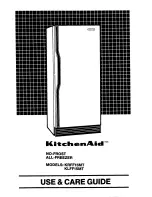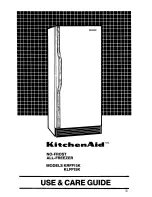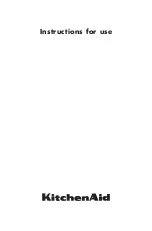
Care and maintenance
WARNING
Risk of electric shock!
Touching live parts may result in severe
injury or death.
■
Before cleaning, unplug the mains
plug from the socket or isolate/un-
screw the fuse.
■
When pulling out the mains plug, al-
ways take hold of the mains plug it-
self and never the mains cord.
CAUTION
Hazards for children and people with
limited physical, sensory or mental ca-
pacity.
■
Cleaning and user maintenance must
not be carried out by children unless
they are supervised.
NOTICE
The surfaces and appliance parts can be
damaged through improper handling.
■
Never use harsh, granular, soda, acid,
solvent-based or abrasive cleaners.
These attack the plastic surfaces.
All-purpose cleaners with a neutral
pH are recommended.
■
Door seals and plastic parts are sen-
sitive to oil and grease. Remove con-
taminants as quickly as possible.
■
Only use soft cloths.
Checking and cleaning door
seals
The door seals must be checked regularly so
that no air can enter the appliance.
1. To test them, clamp a thin piece of paper
in various places. The paper should be
difficult to pull through at all points.
2. If the seal is not uniform everywhere:
Warm the seal in the appropriate places
in front of you with a hair dryer and pull it
out with your fingers.
3. Only clean dirty seals with clean water.
Clean exterior
– Painted surfaces
Use only light pH-neutral soapy water.
– Stainless steel surfaces
Use special stainless steel cleaner from a
specialist shop. Never use polish.
Cleaning the reverse side
Remove dust and clean the back of the ap-
pliance and the compressor once or twice a
year.
• Carefully brush the reverse side of the
appliance and the compressor with a soft
brush.
Defrosting
The appliance does not need to be defrosted.
The no-frost system ensures that no ice can
form during freezing mode. Defrosting is not
necessary.
The appliance is equipped with automatic de-
frosting for the cooling mode. Frost and ice
are automatically defrosted and the thaw wa-
ter is collected in a thaw water container on
the reverse side of the appliance. The thaw
water evaporates as a result of the heat gen-
erated by the motor.
Care and maintenance
Page EN-21














































